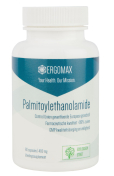Histamine
Histamine is a biogenic amine found both in your body and in food. This substance stimulates the nerve endings of the autonomic nervous system and, as a result, plays a regulatory role in your body. Histamine sends signals to your brain and immune system, influences digestion, helps regulate body temperature, and stimulates respiration and blood circulation. Histamine can be present in food, and it can also be released through fermentation and aging. Despite being a natural substance in the body, your body can only tolerate a limited amount of histamine. The point at which the maximum threshold is reached varies from person to person.
What does histamine do in your body?
Histamine is produced by your body itself. It is a biogenic amine that also acts as a neurotransmitter. Histamine is an important substance in various processes in your body. If you have too much histamine in your body, it can cause problems. This occurs when you consume something that your body doesn't tolerate well, to which you may be intolerant or allergic.
Histamine, Asthma, Eczema, & Allergies
Some people are more sensitive to histamine than others, and in conditions such as asthma, eczema, and allergies, an overreaction of the immune system occurs to substances that are generally harmless to the body. The body then produces a lot of histamine, leading to a range of symptoms. Supplements can offer support to people dealing with sensitivities.
What are histamine-related symptoms?
Histamine-related symptoms manifest differently in each individual. Symptoms that may indicate sensitivities include hay fever, eczema, gastrointestinal problems, hyperactivity, mood swings, itching, headaches, restlessness, behavioral issues, rashes, recurrent infections or colds, chronic cough, and fatigue.
Histamine & Sensitivity
In an allergy, the immune system excessively responds to a substance that is actually harmless, treating it as a threat. Intolerance is a reaction of the body to a substance that doesn't involve the immune system. Intolerance can be more challenging to detect through conventional medical tests because, unlike allergies, there are no traces of antibodies in the blood, although intolerance can sometimes be determined if it's found that the body lacks a certain enzyme. Both intolerances and allergies are forms of sensitivity; your body cannot tolerate something. The symptoms of sensitivities often vary from person to person and can change with age. For instance, babies frequently have eczema, but these symptoms may disappear or shift to the respiratory system or behavior at a later age. It's common for eczema and asthma to alternate in individuals who experience these conditions.
What foods are high in histamine?
If you are sensitive to histamine, it's important to consume foods that are low in histamine or do not trigger histamine release. Examples of histamine-releasing foods include strawberries, alcohol, chocolate, cinnamon, egg white, tomatoes, shellfish, and pork. Foods that are high in histamine include spinach, fish that is not fresh, Parmesan or aged cheese, red wine, yogurt, and fermented vegetables such as sauerkraut.
Choosing the Right Histamine Supplement
When following a low-histamine diet, you may potentially miss out on essential nutrients due to eliminating certain food items. Important nutrients to supplement on a low-histamine diet include iron and vitamin A. It's always a good idea to support your immune system in cases of sensitivities, for example, with quercetin supplements from Dr. Mercola, Doctor’s Best, or Seeking Health. Palmitoylethanolamide (PEA) - OptiPEA® from Ergomax is also a body's natural signaling molecule that works at the cellular level to support and activate various mechanisms in the body.
Histamine & Diamine Oxidase (DAO)
For those with histamine intolerance, there is another substance that can be helpful, and that is the enzyme diamine oxidase, or DAO. This enzyme is responsible for breaking down the histamine that enters your intestines through your diet. Many people with histamine intolerance have a deficiency of this enzyme, or they don't produce it at all. It can help to replenish copper and zinc deficiencies, as this often prompts the body to start producing diamine oxidase again. Seeking Health's Histamine Block is active in the digestive tract and combines DAO with vitamin C in a potent formulation.

